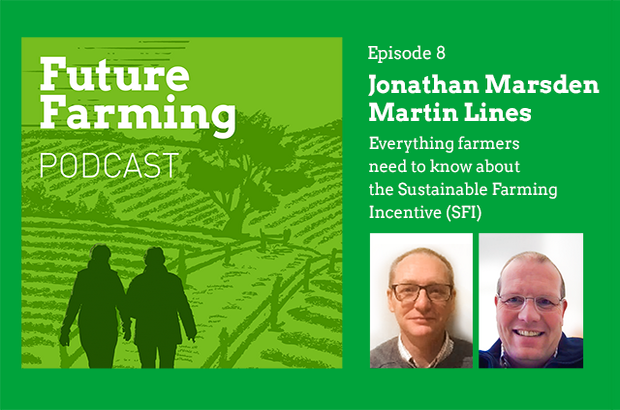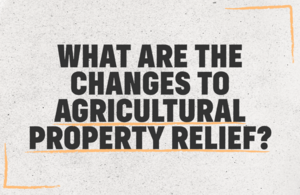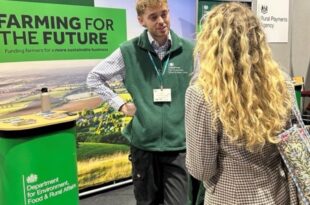
In the latest episode of the Future Farming Podcast, Cambridgeshire farmer Martin Lines and Sustainable Farming Incentive (SFI) lead Jonathan Marsden talk all things SFI and environmental land management.
The pair talk about current and future funding opportunities, Martin's philosophy for farming and how that can help us interpret the Sustainable Farming Incentive.






 The
The 
10 comments
Comment by John Calder posted on
Sadly, as a SFI Pilot participant, I have not found that flexibility and working together with farmers is something that DEFRA found easy to undertake. In the case of my involvement in a practitioner working group, the imposed process limited the scope for ambitious improvements. Co-design could be expected to be the main focus there and the option to consider radical improvements should have been much more welcomed.
Having received an RPA inspection on my SFI Pilot scheme, I have not yet found the RPA to show flexibility such that they would acknowledge where my chosen practice has merit and is equivalent to or better than the traditional prescription, nor has it been my experience that an RPA inspection includes guidance towards improved outcomes.
Hopefully both these observations arise simply because DEFRA & RPA are themselves on a learning curve and I remain hopeful that constructive criticism and greater ambition will be encouraged so that farmers begin to get more positive experiences in these new schemes as the rule. It would be of benefit to everybody involved.
Comment by Sarah Stewart posted on
Hi John,
Thanks for taking the time to comment. I passed your observations on to the SFI pilot team - they extended their thanks and wanted to assure you that your views were recorded during your site visit interview and will inform the design of the scheme. The SFI pilot is a learning exercise and feedback from participants is exactly what we want.
Best wishes,
Sarah
Comment by John Calder posted on
Thanks for publishing this discussion stream, Sarah. I appreciate it, but there is more to say.
Based on the many responses I have received back from the RPA, I have every confidence that scheme improvements could easily result from continued in-depth discussions. My interactions with the RPA really have been that encouraging. They do not just record feedback and allow that to inform them - they appear to be willing to engage in depth. We shall see, but I am optimistic there.
Based on the many responses I have received back from DEFRA, I have little confidence that scheme improvements will result because no in-depth discussions are welcome. Absolutely none have been welcome. This could be explained because DEFRA have embraced an odd interpretation of one of their declared core principles of Co-Design which asks them to 'share power'.
I had imagined this would mean sharing power between DEFRA and their pilot participants (allowing the voice of the participant to be heard above the din of established prescriptions and potentially outdated dogma), but DEFRA mean something quite different by sharing power. They mean restrict the input from the most enthusiastic contributors so that everybody else has their chance to have their say (which could have the effect of suppressing innovation and holding us back from truly ambitious scheme content). DEFRA do not permit a sustained discussion on those ideas that would stretch the scheme into the realms of being truly effective. I cannot bear to be this pessimistic, but I am given no alternative and my original post stands firm.
Kind regards
Comment by The Team posted on
Hi John, thanks for your comment.
Perhaps it's worth clarifying the co-design process and upcoming milestones to reassure you and the farming community that Defra is working with farmers, agricultural stakeholders and environmental organisations to design a scheme that works.
To support the development of our offers within the Sustainable Farming Incentive, we're working with one internal and two external focus groups for each theme.
We are keen to hear viewpoints from each group, to ensure we receive comments and concerns that reflect the experiences of different farmers in different geographies with different farm types.
As you will understand from the groups you sit on, meeting frequencies have been structured so as to provide everyone across those three groups with an equal opportunity to have their say within the delivery timeline.
We have received suggestions and comment through these groups and also via email and can confirm that all thoughts and ideas submitted to us have been logged, discussed with all 3 groups and where appropriate, taken forward after this discussion and an evidence review. We are grateful for the ideas you have shared with us to date in the fortnightly hedgerow meetings as we progressed suggested actions into a draft standard.
After a brief pause due to the recent changes in government, we will be returning to your group to update on payments rates as planned.
Best Wishes,
The Team
Comment by Juan L. Vicente posted on
I am a participant in the Hedgerow PWG, and a bit disappointed that when (thanks to all the inputs and suggestions from the farmers) we managed to get the ball rolling and in the right format, the meetings stopped and it has been 2 months now since the last happened.
Also, many of the farmers present in the PWG have been commenting outside the official PWG meetings to share thoughts and feelings, and many of us agree that the proposed Advanced level is not what it should be. As in the last PWG meeting we have been told that there will be no more scheme development to be attempted in our PWG, and we see no intention to modify the Advanced level, we are very disappointed. We are close to losing heart and hope, as we have already lost confidence in the co-design method.
Comment by Sarah Stewart posted on
Hi Juan,
Thanks for getting in touch. I caught up with the team who explained the work that's happened over the past few months.
As you will understand from your participation in the hedgerows Practitioner Working Group, Defra is working with three groups comprised of farmers, internal policy teams and agricultural and environmental stakeholders.
In recognition of the fact that farmers interested in this standard come from many different geographies and farming types we are keen to develop a standard that is reflective of those differences and are providing everyone across those three groups with an equal opportunity to have their say within the delivery timeline.
We must balance the often differing feedback from all of these groups into the development of this draft standard and assess it all against environmental and delivery considerations. We greatly appreciate the input you and other farmers have provided during the numerous working group sessions in the development process and, after sharing the outcome of that work with you in September in the form of a draft standard, have continued to take subsequent comments and feedback on board. We would like to reassure you that we will be returning to your groups soon for further discussion of the standard.
The recent changes in government meant that we weren't able to talk about our work in the usual way, but with the new ministerial team settled in, we will be returning to the hedgerows group with the draft payment rates, built on our joint assumptions session, and the updated standard.
Best wishes,
Sarah
Comment by Mariah Ballam posted on
Hi Johnathan,
I wonder if you or anyone else from DEFRA would come and give a training session on SFI to the farm cluster that I organise? If not can you recommend anyone in the Suffolk area who could offer this?
We do have a member of our cluster who has taken part in the SFI pilot scheme.
Many thanks,
Mariah Ballam
Comment by Sarah Stewart posted on
Hi Mariah,
Thanks very much for getting in touch. This is something our engagement team would be happy to pick up with you. Is it alright if I reply to you using the email address you supplied?
Best wishes,
Sarah
Comment by Mariah Ballam posted on
That would be great, please do email me.
Comment by Sarah Stewart posted on
Lovely. I've just emailed you and copied in my colleague Rosie, who will help to arrange a session for your cluster.
Best wishes,
Sarah